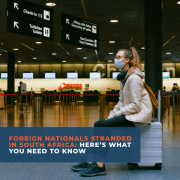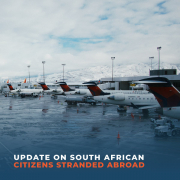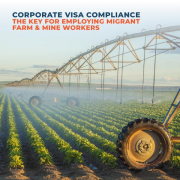NEWS | FOREIGN NATIONALS STRANDED IN SOUTH AFRICA: HERE’S WHAT YOU NEED TO KNOW
/in Archived, News /by xp-adminThe COVID-19 pandemic has left many foreigner nationals feeling anxious for various reasons, including the fact that the rapid global shutdown of travel and imposition of lockdowns has left many stranded, especially those who are mere tourists with no intention of staying indefinitely.
President Cyril Ramaphosa declared a national state of disaster on 15 March 2020 and, subsequently, a national lockdown from 27 March, extended until end of April 2020, to contain the spread of COVID-19. Further measures were introduced for May 2020 which included a “Risk Adjusted Strategy” for a phased reopening of the economy based on 5 coronavirus risk levels. With South Africa currently in a level 4 lockdown as of 15 May 2020, VFS and the Department of Home Affairs’ visa sections remain closed.
I am stuck in South Africa and my visa is expiring, what now?
Nevertheless, if a foreign national is in South Africa and their visa expires while the Department of Home Affairs and VFS offices are closed, the holder of such visa will not be penalised. Those wishing to leave will be allowed to exit without being imposed the normal overstay ban, and for those who wish to stay longer, can renew their visas when the VFS offices reopen. No date for the reopening has been confirmed at this stage.
The visa concessions listed below apply to those with visas which expired from 1 December 2019 onwards, unless a person has proof that he/she had already submitted an application for a visa extension prior to this date and the outcome is pending.
These temporary measures will remain valid until 31 July 2020 unless extended officially by the Department. They apply only to foreign nationals who have been legally admitted into the Republic.
The visa concessions are contained in the Directions which have been issued by the Department in terms of the Disaster Management Act, 2002. Below a brief overview –
Expiry of visas
Holders of temporary residence visas which expired from 1 December 2019 onwards, who did not renew their visas before the lockdown, will not be declared illegal or prohibited persons.
Those who opt to return to their countries of origin or residence after the lockdown, and departs before 1 July, will not be declared undesirable upon departure.
Visa application and adjudication
During the lockdown, the Department is not receiving or adjudicating applications for temporary residence visas and for permanent residence permits.
Foreign nationals whose visas expired during the lockdown period may apply for the renewal of respective visas or relevant visa exemptions while in the Republic immediately after the lockdown has been lifted. They will not be required to apply for authorisation to remain in the country (Good Cause/ Form 20), which is usually required where a person overstays their visa.
Foreign nationals whose visas expired after 1 December 2019 who had scheduled appointments on dates which fall within the lockdown period should reschedule their appointments to an available date after the lockdown has been lifted.
Work, Study and Business while application are pending
Those with visas expired during the lockdown and those who have submitted their applications before the lockdown but their applications are still pending, will be allowed to work, study or conduct business after the lockdown while waiting for the outcome of their applications.
Revoked Visas
Visas issued to nationals of China and Iraq, who had not yet entered the Republic by 15 March 2020, were revoked as per the Directions issued by the Department in terms of the Disaster Management Act, 2002. These visas remain revoked.
Departure of foreign nationals
During the lockdown, except for cases relating to expatriation initiated by another state, all foreign nationals who are currently in South Africa may not depart.
Lesotho exemption permit
Holders of the Lesotho Special Permit have up to 15 June 2020 to submit their applications for the Lesotho Exemption Permit. The Lesotho Special Permits which expired on 31 December 2019 remain valid until 15 June 2020. No new applications will be accepted during the lockdown period.
Expiry of asylum seeker permits
Any asylum seeker whose visa expired from 16 March 2020 to the end of the lockdown period will not be penalised or arrested provided that they legalise their visa within 30 calendar days of the lockdown being lifted.
For many foreigners, their residence position can be quite nuanced. Foreigners who are in SA and would like to extend their stay after the lockdown, are advised to act quickly on their residency status and prepare their documentation ahead of time.






